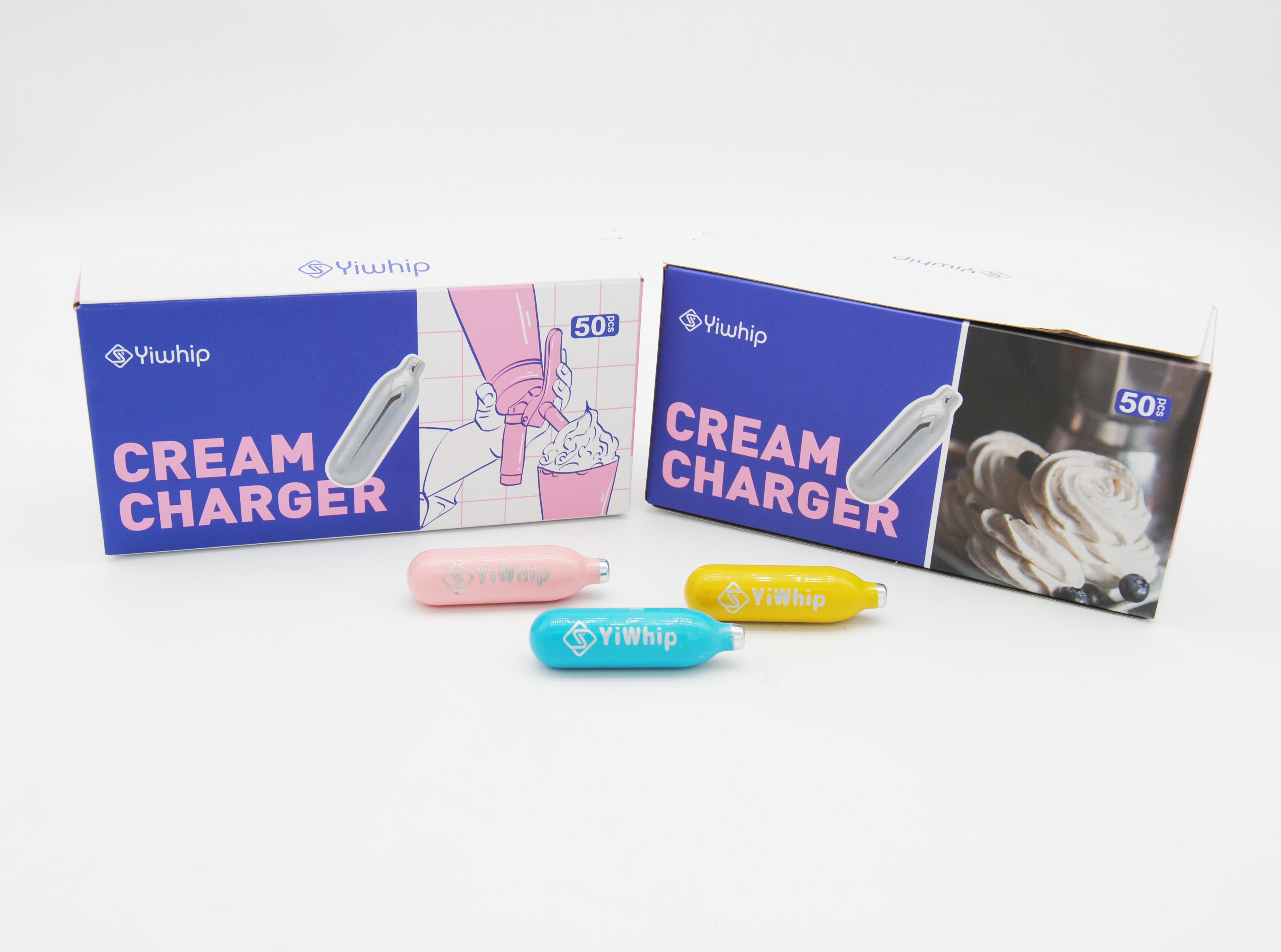Are you a business owner in the food service or catering industry in Dominican Republic? Perhaps you own a café, a pastry shop, or even manage high-end culinary experiences at a resort. No matter your specific niche, if you regularly use whipped cream dispensers — commonly known as **cream chargers** — then supplier choice might seem like a routine operational task. But dig a little deeper and you realize this decision carries unseen, but serious implications.
Why do we say hidden costs? Well, because not every supplier is created equal. Some promise low prices but compromise quality, reliability, or customer support. In the short run, you save money. In the long run, those "savings" can lead to higher repair bills, downtime, product loss — and worst of all — damaged reputation. Especially when customer expectations in countries like Dominican Republic are high and competition is rising.
What Exactly Are Cream Chargers and Why Supplier Quality Matters
If you're relatively new to commercial cooking or dessert making, the term "cream charger" might still be something you associate more with kitchen tools rather than industrial-grade equipment. Simply put, a cream charger is a small nitrous oxide (N₂O) cartridge used in conjunction with a whip cream dispenser to quickly aerate heavy creams, foams, mousses, and other liquid bases.
A premium cream charger means consistent pressure distribution, smoother textures, faster preparation — in short: professional performance. A cheaper alternative might sputter inconsistently, produce unreliable texture output, cause potential blockages, or even safety issues in extreme cases.
In the Dominican market, there are several manufacturers and suppliers promising the best results — but that’s rarely how it plays out in the real world.
- N₂O canister consistency matters greatly.
- Precision threading ensures no gas leakage or nozzle jamming
- Storage life varies significantly between different brands.
- Certificate standards (like ISO, FDA, and UN-certification for gas tanks) are non-negotiables.
Unfortunately, poor supplier quality isn't easy to detect upfront until a shipment arrives — or your head chef comes complaining of faulty devices.
The True Risks Beyond Just Price Differences
You probably receive inquiries and WhatsApp catalogs offering “imported chargers," sometimes at half the standard market rate, tempting many businesses into trying them just once. What usually happens after that initial batch includes unexpected issues.
| Risk | Description | Impact |
|---|---|---|
| Lifespan Issues | Non-reliable seals or incorrect metal grade reduce usability lifespan from thousands of uses to a few hundred shots. | Highest long-run waste and cost inflation. |
| Safety Defects | Chargers with thin walls or improper manufacturing could leak during firing phase. | Dangerous exposure risk. Not safe for kitchen settings. |
| Taste Interference | Poor coatings inside cartridges alter flavor of infused ingredients (especially dairy products) | Customers may complain about unusual flavors, damaging restaurant image. |
All the problems listed are not always tied to pricing alone. However, when a seller markets extremely low-cost alternatives while skipping transparency on materials or certifications — it’s wise to question whether their business aligns more with penny-saving than profit-ensuring strategies.
The Importance of Certification & Safety Standards
You wouldn't use a propane line that lacked fire safety approval. Similarly, N₂O cream charging systems should never be treated casually. The nitrous oxide pressurizing agents need specialized sealing mechanisms inside the cartridge body — and most importantly, the right pressure tolerances. Otherwise?
You may notice incomplete whipping cycles. Or in extreme conditions, over-pressured canister bursts. These issues aren’t hypothetical; numerous cafés across Haiti, Cuba, Puerto Rico, and yes—parts of Dominican Republic too—have encountered kitchen malfunctions linked directly to sub-par suppliers.
The only foolproof ways to vet for safety compliance are:
- Careful inspection of international certifications (e.g., CE/UN/FDA markings)
- Traceable supply-chain verification
- Testing sample sets through lab-approved procedures (when applicable).
Think long-term here. It pays better dividends to spend $40 more per carton to ensure full ISO compliance and liability coverages in place in case anything goes wrong than risking a major incident that leads to fines and legal claims. After all – kitchens run on safety, efficiency, AND trust.
Operational Disruptions You Rarely Account For
You're preparing for a big hotel wedding function in Punta Cana or Santo Domingo when three crucial units stop releasing properly. One fails mid-presentation — a critical failure in live service where time equals reputation. You didn’t see these moments coming when purchasing from an inconsistent distributor months earlier.
This ripple of inconvenience doesn’t just end at a malfunctioning charger either:
- No backup stock = delayed order completion
- Limited reorder timelines due to bad communication with unresponsive suppliers
- Increased internal maintenance hours cleaning defective nozzles and recalibrating dispensers
In a fast-paced market like Dominican hospitality scene where tourists return based solely on positive dining and sensory impressions, one misstep caused by cheap chargers is hard to explain and impossible to take back.
Let me emphasize this: Every guest who tastes something off due to inferior nitrous oxide charge remembers that moment longer than they ever compliment perfect foam on vanilla panna cotta.To minimize this scenario's probability entirely — you must work with local vendors backed by national distributors known for maintaining cold chain storage systems, quick delivery logistics, technical warranties — and last, personal responsiveness when things do occasionally go off-rails, which inevitably will happen once or twice each year.
Selecting the Right Cream Charger Supplier Is Like Choosing a Trusted Kitchen Team Player
- Meticulousness of delivery scheduling.
- Returns management policies and exchanges for duds.
- Packaging quality against climate factors unique to DR tropical conditions.
We suggest creating a checklist for any vendor you engage — including these five key points:
- Demonstrated understanding of commercial application demands
- Absolutelity of available warranty returns (no extra hassle policy!)
- Proven track record servicing businesses across Dominican islands
- Ability to provide product samples without push-back
- Ease of scaling purchases depending on holiday and high-season traffic peaks
Your Business Reputation Hangs in the Balance
Every successful restaurant, cafe or catering business knows what truly distinguishes top-performing eateries from others. Often, it boils down not simply to star-chefs wielding rarefied knife-skills, but also subtle elements like the seamless, predictable behavior of their prep-line hardware. Your kitchen culture depends on having tools that work as designed — every time. Including when a team rushes during Saturday evening brunch or a sudden burst in weekend orders hits early Sunday morning. Choosing a certified and locally supported cream charger brand helps you avoid common pain points:- Last-minute substitutions due to equipment flaws
- Poorer ingredient integration affecting taste and texture consistency
- Kitchen staff frustration from repetitive troubleshooting
- Negative feedback slipping onto online platforms such as TripAdvisor and Yelp
- Educate all purchasing managers and culinary directors on cream charger basics before buying season begins
- Ask vendors specifically about shelf lives and ambient heat sensitivity factors in Dominican environments
- Establish dual-suppliers to hedge procurement risks without doubling unnecessary costs
- Keep quarterly testing logs comparing usage stats between charger varieties
- Create emergency protocols covering rapid replacement options in case urgent demand surge spikes unexpectedly
Whether your location lies along Playa Juanillo or La Romana beach resorts — you owe clients consistency regardless of setting, theme or ambiance. Let every plate speak for itself through excellence, without letting a $5 part dictate its destiny via a preventable flaw somewhere deep inside its nitrogen chamber.
Final Thought: Choose Stability. Build Predictability. Protect Brand Equity
Pursuing lower initial costs may yield temporary accounting pleasure on budget statements — until cumulative failures stack up invisibly over six-to-twelve-month periods. At the heart of responsible decision-making lies one principle:- Cost minimization does not equal true savings.
- Reliability translates more closely into long-term ROI in the F&B business.
As you finalize your next contract bid or vendor list renewal request, remember: a great cream charger doesn’t stand out just by its chrome polish, size, or label branding on aluminum casing. Instead, greatness is revealed by how seamlessly — or rather, silently — it integrates into your everyday culinary execution process without demanding special attention or repairs every few hundred shots. And even more subtly? By never allowing tasting inconsistencies to appear between two otherwise identical desserts on adjacent plates served during the dinner rush hour at a five-course event.
Final Words On Avoiding Regret When Sourcing Kitchen Chargers
To sum up everything discussed:- Cheap ≠ Smart Buying Strategy
- Initial savings could mean larger losses later via repeated malfunctions, increased service complaints or expensive cleanups after system breakdowns occur unpredictably on busy days
- Safety Compliance Isn't Negotiable
- Your entire culinary experience must comply strictly with global kitchen appliance and pressurized gas regulation frameworks. Anything less invites disaster scenarios that hurt not only margins, but public trust overall.
- Brand Protection Begins at Back-of-the-Kitchen
- A single faulty cream texture served during a VIP review or online photo post could damage digital visibility harder than recovering SEO after content penalties!
In conclusion - choose partners that offer proven reliability, strong safety documentation tracking and excellent local availability instead chasing after the cheapest quote from unvetted suppliers. That is the pathway not just to cost containment, but ultimately, sustainable profitability.

